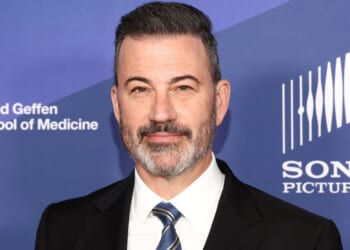Heritage Foundation founder and former president Ed Feulner was remembered Monday at a memorial service for his commitment to moral seriousness.
Feulner, who passed away on July 18, served as Heritage’s president from 1977 to 2013 and again from May 2017 to January 2018. His Mass of Christian burial took place at the Basilica of Saint Mary in Alexandria, Virginia. Feulner was a practicing Catholic and a graduate of the Jesuit-run Regis University in Denver, Colorado.
During the service, he was commemorated by grandson William Lown, who shared his experience knowing the conservative legend foremost as a grandfather.
“Growing up, I had no idea the man, my grandfather, was outside of our family. It wasn’t until I was about 8 years old that I attended Heritage’s New York City Christmas party for the first time, and I had multiple people come up and tell me how much of a legend. … He was only a legend because he would convince my parents to let me stay up late and eat his favorite crinkle [cookie] with him,” Lown recalled fondly.
“It has truly been inspiring to grow up and see the impact my grandfather had, on not only our beloved country, but throughout the world,” Lown eulogized.
Feulner’s son, Edwin J. Feulner III, elaborated on his father’s famous catchphrase, “Onward!”
“There are so many analogies I could use this quote for with Dad. They almost write themselves, the ascending 60 years, always-uphill path of moving conservatism into the mainstream, or convincing people and leaders around the world that freedom is actually the best way to govern your people, and so many more examples that made up Dad’s life’s work. He knew the important things in life would not come easy, yet those are the ones worth climbing the hill for,” he said.
Fr. Robert Sirico, the founder of the Acton Institute for the Study of Religion and Liberty, a think tank that Feulner served on the board of, gave the service’s funeral homily.
Sirico began his address by noting that it was above his pay grade to canonize Ed and that he feared that “there would be many in this city of the devil’s advocates who would impede the process of his cause,” prompting chuckles from assembled friends and family.
The Catholic cleric continued, “Rather, we gather today in the presence of the risen Lord, who is the way, the truth, and the life, and by whom we are each invited to follow to that place that He invites us. We do this with tears gripped by grief, but not by despair, because again, as Jesus admonishes us in the opening words of this Gospel, ‘Let not your hearts be troubled.’”
Sirico, who collaborated with Feulner for years, remembered him as “a man of intellect, conviction, immense public influence.”
“But today we do not stand here to catalog his accomplishments, though they were many. Rather, we come to acknowledge something more important. He was a baptized son of God, sealed with the Holy Spirit, nourished with the Holy Eucharist, and sent forth into the world to bear witness to that truth. He ran this race before our eyes, and often encouraged many of us present here to run along with him,” the Catholic priest explained.
Sirico added, Feulner “never let his faith be hidden. He allowed it to inform his love for this country, his commitment to ordered liberty, and in his defense of the dignity of every single person, without regard to their status. His work was animated not by ideology, but by a deep moral seriousness, what St. Thomas Aquinas would call magnanimitas—magnanimity.”
“That is the virtue of a great soul, bigheartedness, which seeks to do great things for God, for the truth and for the glory and good of others. It is one of the noblest and most overlooked of the Christian virtues. It refers to the disposition of the soul toward greatness, especially in the pursuit of honor, excellence, and holiness—again, all for the glory of God and the good of others,” he continued.
“You see, Ed did not believe that the success of some required the diminishment of others, either in the world of ideas or in the operations of a free economy. This virtue, which St Thomas called the ornament of all the other virtues, elevates these other virtues by setting them in service to great ends,” he said. “Ed believed this. He staked his life on it. And so even as we mourn his death, we hold fast to the hope that he now sees, not dimly as in a glass or a mirror, but face to face that he would come to know even as he was known, the Lord whom he served through his work, his mind, his prayers, and his confessions.”

















